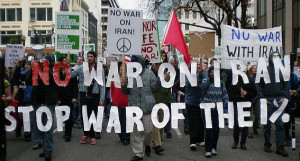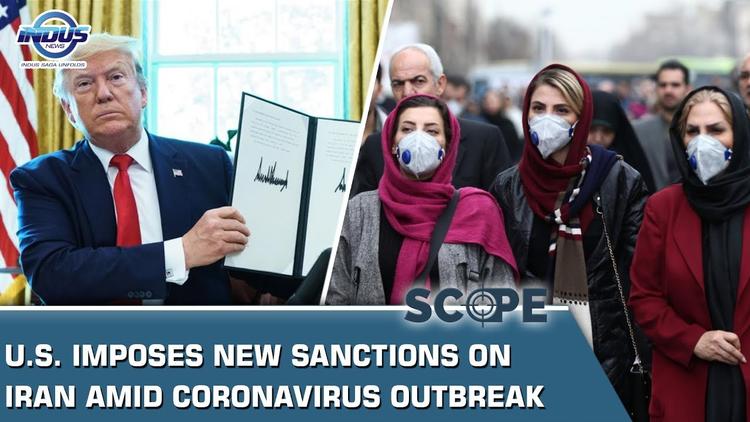
Bonnie Kristian / The American Conservative
(January 13, 2021) — It is nigh impossible to look away from the chaos in Washington, but US-Iran relations in the waning days of the Trump administration deserve a wary glance.
Two US bombers flew a “deterrence mission” in the Gulf region this past Thursday. US Central Command has yet to release a statement on the flight, but an official described the last such mission in December as a means of ensuring “that if the Iranians do think they have a plan that’s executable, that they think twice before executing it, because they do see that we have a robust posture and presence still remaining in the region that could respond to any provocation should it occur.”
Official language was similar: “Potential adversaries should understand that no nation on earth is more ready and capable of rapidly deploying additional combat power in the face of any aggression,” said CENTCOM Commander General Frank McKenzie, who described the bomber mission as an exercise in readiness for a conflict “[w]e do not seek.”
It is nigh impossible to look away from the chaos in Washington, but US-Iran relations in the waning days of the Trump administration deserve a wary glance.
Two US bombers flew a “deterrence mission” in the Gulf region this past Thursday. US Central Command has yet to release a statement on the flight, but an official described the last such mission in December as a means of ensuring “that if the Iranians do think they have a plan that’s executable, that they think twice before executing it, because they do see that we have a robust posture and presence still remaining in the region that could respond to any provocation should it occur.”

Official language was similar: “Potential adversaries should understand that no nation on earth is more ready and capable of rapidly deploying additional combat power in the face of any aggression,” said CENTCOM Commander General Frank McKenzie, who described the bomber mission as an exercise in readiness for a conflict “[w]e do not seek.”
But what if this isn’t mere readiness? What if it’s saber-rattling more likely to result in escalation than deterrence? What if it brings that unsought conflict closer? Escalation has been the enduring theme of US-Iran relations during the Trump years, and particularly with turmoil and presidential transition at home, we should not be courting more conflict abroad.
But courting conflict with Iran is exactly what the Trump administration is doing. Beyond the flight missions, a redeployment of the aircraft carrier USS Nimitz from the Persian Gulf was reversed on Sunday, and Navy Secretary Kenneth Braithwaite said he did not know “how long that extension will last.” Other US ships, bristling with missiles, arrived in the region last month, making a deliberate show of force.
President Trump reportedly explored options including “a military strike” against Iran in November, and his administration planned a “flood” of new sanctions on Iran before the end of their term. On Monday, Secretary of State Mike Pompeo announced he would designate the Iran-linked Houthi rebels in Yemen as a foreign terrorist group—a move widely derided as counterfactual and counterproductive to ending Yemen’s civil war—and on Tuesday, he baselessly accused Iran of harboring al-Qaeda.
Iran has responded in turn with new provocations. Iranian forces raided a South Korean-flagged tanker on Monday in protest of US sanctions, then conducted military drills with “suicide drones” on Tuesday. That same day, Tehran asked Interpol to post an arrest notice for Trump and 47 other US officials for their role in the assassination of Iranian General Qassem Soleimani a year ago. (Interpol declined, but Iraq issued an arrest warrant for Trump in connection to the same strike.) On Thursday, Iranian President Hassan Rouhani used the storming of the Capitol in Washington as an occasion to denounce US democracy as “floppy and weak.”

The carrier deployment was changed “due to recent threats issued by Iranian leaders against President Trump and other US government officials,” said acting Defense Secretary Christopher Miller on Sunday, before the tanker raid and suicide drones and arrest warrants and insults. Miller spoke of past threats, but the real concern was clearly forward-facing: that Iran would take its long-promised additional revenge for the Soleimani strike.
That very context should be a lesson that pushes us toward greater prudence. US-Iran tensions are as high as they are because the Trump administration capped three years of needless diplomatic rupture and proxy conflict with a killing that easily could have escalated beyond Iran’s retaliatory and nonfatal missile barrage of a US base in Iraq.
“If Iran had killed the commander of US Central Command, what would we consider it to be?” asked Douglas Silliman, who served as US ambassador to Iraq from 2016 to 2019, shortly after the Soleimani strike. The answer is obvious, and our brush with open conflict this time last year was far too close.
We are still too close to conflict now, and the US military build-up on Iran’s doorstep makes that conflict more likely, not less. Soleimani’s death did not deter Iran; it did not produce the relative quiet that prevailed after both sides backed off last January—that was the result of the COVID-19 pandemic and Tehran’s decision to wait out Trump.
There’s good reason to think Tehran will be more willing to cooperate with the incoming administration, which plans to rejoin the nuclear deal. But such cooperation will be difficult if the outgoing administration crams a new war into its last two weeks, whether willfully or by accident or miscalculation. This is a time to tread lightly. The prudent choice would be to bring American forces home from within Iran’s limited reach instead of massing them there for a fight.
Bonnie Kristian is a fellow at Defense Priorities, contributing editor at The Week, and columnist at Christianity Today. Her writing has also appeared at CNN, NBC, USA Today, the Los Angeles Times, and Defense One, among other outlets.
Posted in accordance with Title 17, Section 107, US Code, for noncommercial, educational purposes.